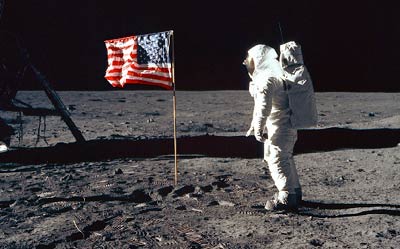Why are we celebrating the great Moon hoax?by Michael Potter
|
| Yes, the US won the space sprint, and was victorious in the Cold War. But the Russians are winning the space marathon. |
Ironically, one of the central outcomes of the Soviet-US space race in the 1950s and 1960s were intercontinental ballistic missiles (ICBMs). It should strike us as odd that we have been unable to place the nuclear technology genie back in the bottle, but somehow we have managed to place the peaceful technologies required to live and work on the Moon, and possibly other planets, back into the genie’s bottle, where they are now largely unknown and realistically unavailable to America anytime in the near future.
In 2010 the US will be retiring the space shuttle, its only human-rated space vehicle. NASA will be paying the Russians $55 million a seat for each American astronaut that flies after 2010. So what are we celebrating when we commemorate the Moon landing? That the US has forfeited its space and Moon leadership to the Russians, Chinese, and Indians?
Yes, the US won the space sprint, and was victorious in the Cold War. But the Russians are winning the space marathon. The Russians have a much to teach NASA on robust space systems, reliability, commercialization, getting tremendous bang for the buck, and surprisingly, even about openness!
I recently produced and directed a film titled Orphans of Apollo about what I believe is the “greatest space story never told.” The film documents a small band of entrepreneurial rebels who “captured” the Russian space station Mir with American dollars and attempted the most ambitious space startup business the Earth has ever seen.
Though it is a compelling story, Mir was de-orbited eight years ago. What relevance does this story have today? First, the story of private American citizens attempting to commercialize an old Soviet space station turns out to be the perfect reflection, in a microcosm, of the entire space policy debate. Second, there are critical lessons about the value of bold, insightful leadership, and how a tiny group of individuals can make a dramatic impact. The dream to privatize Mir may have failed, but time will prove that it opened the door to a new commercial way of thinking about enterprise in space.
The Apollo program inspired an entire generation to believe that their destiny was to live and work on the Moon. My film takes its name from a sentiment expressed by one of the participants in the Russian space station drama: when President Nixon shut down the Apollo space program in 1972, “we, the children of Apollo, felt like orphans of Apollo.”
The problems facing the US space program are not budgetary or technology but a woeful lack of leadership and pervasive congressional, political, and bureaucratic dysfunction. Last week the US Senate confirmed President Obama’s choice for a new NASA administrator, Charlie Bolden, and deputy administrator Lori Garver. They must move quickly and decisively to regain America’s status as a global space powerhouse. How? By ensuring that under their leadership the new NASA is seriously committed to leveraging the power of private commercial enterprise.
A billion dollars spent on federal bureaucracy is guaranteed to produce negative returns. A billion dollars invested in small and medium-sized space technology companies has the compelling potential to generate exponential technological and financial returns.
| It is perhaps one of the greatest hoaxes to believe that the historic Moon landings were part of a rational, coherent sustainable strategy for the permanent habitation of humans in the heavens. |
I believe NASA could learn a lot about organizational structure and mission from the Defense Advanced Research Projects Agency (DARPA). The new administrator should view NASA as a technology consumer instead of a technology producer. This is the most effective way to carve a new and innovative path to space. As taxpayers funding NASA, we should demand that the agency completely overhaul its way of doing business. It is time for NASA to leverage dollars and technologies through private enterprise, to view private firms as a help and not a hindrance to our national goals.
It is perhaps one of the greatest hoaxes to believe that the historic Moon landings were part of a rational, coherent sustainable strategy for the permanent habitation of humans in the heavens. If we are not honest and serious about our challenges to conquer the heavens, then I believe we should consider more subdued celebrations.
On the other hand, if we collectively take our “small step” and we can be honest about the current problems and challenges that we face, and if we are willing to aggressively enter into a results-oriented mode, we have much to celebrate about the future, one where optimism, ingenuity, tenacity, and vision will triumph, and so will humankind. This time when we return to the lunar surface, under the banner of Moon 2.0, let’s go there with the intention to stay.
